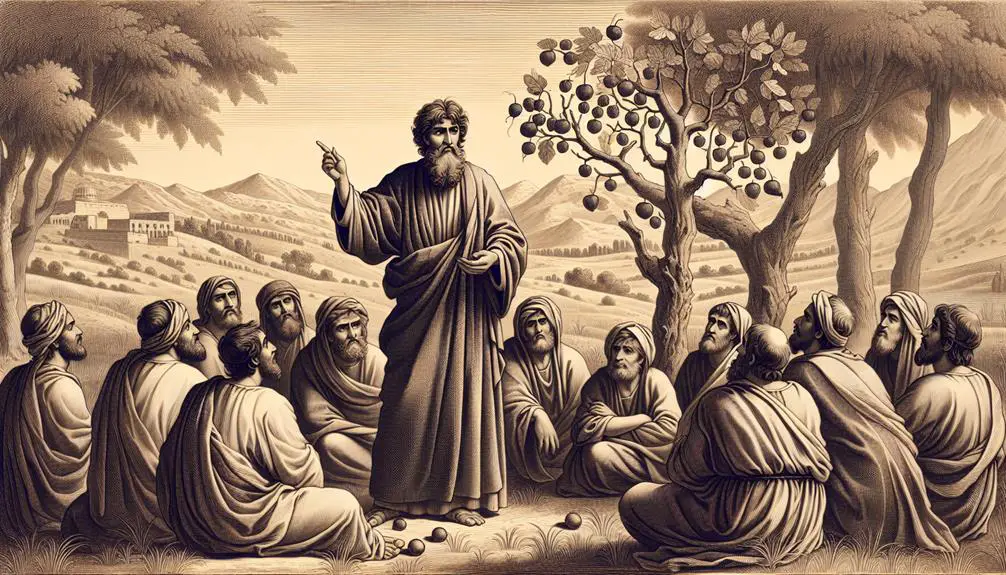Gain insights from ancient scriptures on tackling procrastination, exploring how biblical stories reveal the perils of delay and the power of prompt action.

Procrastination in the Bible
Procrastination, often seen as a modern-day ailment of productivity, finds its roots deeply embedded in ancient texts, including the Bible. Through narratives such as the Parable of the Talents and the story of Jonah, the scriptures offer profound insights into the consequences of delay and the virtue of timely action.
Reflecting on these lessons not only sheds light on spiritual readiness but also on how ancient wisdom can guide contemporary challenges. As we explore these biblical instances, one must ponder: what timeless truths can we glean about overcoming procrastination and embracing diligence in our daily lives?
Key Takeaways
- Procrastination contrasts divine teachings, leading to missed opportunities and spiritual unreadiness.
- Biblical narratives highlight the importance of diligence, proactive work, and vigilance.
- Delaying obedience or tasks risks divine judgment, as shown in Jesus' parables and Jonah's story.
- The Bible advocates for structured time management and accountability to prevent complacency.
The Parable of the Talents

In the Parable of the Talents, found in the Gospel of Matthew, Jesus presents a compelling narrative that serves as a cautionary tale against the perils of procrastination and the importance of diligent stewardship. This parable, rich in metaphorical depth, illustrates the consequences of inaction and fear, particularly in the context of investment fear, and the critical nature of servant accountability. Through the lens of three servants, each entrusted with varying amounts of talents (a form of currency), the story unfolds to reveal the outcomes of their decisions to either invest or bury their allotment.
The servant who out of fear chooses to bury his talent, thereby avoiding any risk, is ultimately condemned for his inaction. This character's decision is emblematic of investment fear, a psychological barrier that can prevent individuals from taking necessary risks for growth, both spiritually and materially. The master's rebuke of this servant underscores the expectation of proactive engagement with the resources one is given, highlighting a divine mandate against idle complacency.
Furthermore, the narrative delves into the theme of servant accountability, suggesting that each individual will be held responsible for their stewardship of God's gifts. The contrasting outcomes for the servants who invested their talents versus the one who did not, serve as a stark reminder of the importance of utilizing one's gifts and opportunities for advancement. Implicit in this is a critique of procrastination driven by fear, advocating instead for a life characterized by purposeful action and responsibility.
In essence, the Parable of the Talents offers a theological reflection on the virtues of diligence and the hazards of procrastination, framed within the context of investment fear and servant accountability.
Solomon's Wisdom on Diligence

In examining the teachings of Solomon, a profound understanding of the value of diligence emerges, presenting a stark contrast to the pitfalls of procrastination. His proverbs extol the virtues of embracing daily diligence, highlighting the tangible rewards wisdom bestows upon those who commit to their work.
Furthermore, Solomon's insights serve as a cautionary guide, steering us away from the complacency of the sluggard, which inevitably leads to ruin.
Embracing Daily Diligence
How does Solomon's wisdom, as depicted in the scriptures, guide us towards embracing daily diligence as a pivotal aspect of our lives? Solomon's teachings emphasize the importance of structuring our days with purpose and persistence, aligning closely with the concepts of morning routines and goal setting. By valuing these practices, we cultivate a disciplined life, steering clear of procrastination.
Aspect |
Solomon's Guidance |
|---|---|
Morning Routines |
Begin each day with focus and intention. |
Goal Setting |
Set clear, achievable objectives for daily progress. |
Diligence |
Persist in efforts, regardless of obstacles. |
Through this lens, Solomon's ancient wisdom remains remarkably relevant, advocating for a proactive approach to our tasks and responsibilities.
Wisdom's Reward for Work
Solomon's wisdom offers profound insights into the intrinsic value of diligence, revealing the manifold rewards that await those who persevere in their work with unwavering commitment. His teachings, deeply embedded in biblical text, underscore the importance of task delegation and motivation techniques as pivotal components for achieving excellence in any endeavor.
Solomon's discourse on diligence transcends mere advice, serving as a testament to the profound outcomes of hard work, organizational strategy, and the astute management of resources. By advocating for a diligent approach to work, Solomon elucidates a path toward not only material success but also personal fulfillment and societal contribution.
His wisdom, therefore, not only instructs but also inspires, highlighting diligence as a virtue that garners both immediate and lasting rewards.
Avoiding the Sluggard's Trap
Building upon the foundation of diligence as a pathway to success, it is crucial to explore how Solomon also warns against the perils of complacency, illustrating the stark contrasts between the industrious and the idle.
In the age of Solomon, the pitfalls of laziness were evident in the neglect of one's duties or vineyard. In today's context, this can be paralleled with modern distractions that all too often lead individuals away from their responsibilities.
Solomon's teachings encourage not only hard work but also wise time allocation. By understanding the value of each moment and prioritizing tasks accordingly, one can avoid the 'sluggard's trap' of procrastination and idleness.
This wisdom holds profound relevance, offering a timeless lesson on the importance of diligence in the face of ever-present distractions.
Paul's Letters on Time Management

Paul's epistles offer a profound perspective on the stewardship of time, emphasizing the importance of 'redeeming the time' within the Christian ethos. His urgent call for prioritizing spiritual actions over temporal concerns invites a closer examination of the ways in which these teachings can be applied to contemporary issues of procrastination and time management.
This analysis seeks to unpack the layers of meaning behind Paul's words, exploring their relevance for both individual and communal practices of diligence and mindfulness in the allocation of time.
Redeeming the Time
In his epistles, Paul frequently emphasizes the importance of 'redeeming the time,' advocating for a deliberate and purposeful approach to time management as a crucial aspect of Christian living. This concept suggests a strategic allocation of one's time to activities that align with spiritual and moral growth, underscoring the finite nature of time and the necessity for its wise use.
Paul's discourse on time allocation and task prioritization serves not only as a practical guide for daily living but also as a theological imperative, highlighting the stewardship of time as a divine responsibility entrusted to believers. By framing time management within the context of spiritual obedience and service, Paul elevates the mundane act of scheduling to an act of worship, urging Christians to live intentionally in alignment with God's will.
Urgency in Paul's Words
Having explored the concept of redeeming the time, it becomes imperative to examine the sense of urgency that permeates Paul's letters regarding time management.
Paul's exhortations are rife with calls for immediate action and a sense of decision-making urgency, reflecting a deep understanding of the transient nature of human existence. This urgency is not rooted in anxiety but in a profound awareness of the opportunity each moment presents for growth, service, and preparation for eternity.
Prioritizing Spiritual Actions
Delving into the epistles, one observes a recurring emphasis on the prioritization of spiritual actions as a cornerstone of effective time management, as advocated by Paul. This focus is manifest in several key practices:
- Mindful meditation – Allocating time for reflection and connection with the divine.
- Prayer – Regular, disciplined communication with God as a non-negotiable aspect of daily life.
- Study of Scripture – Dedicated periods for understanding the Word, thereby aligning actions with divine will.
- Service to Others – A commitment to act selflessly, viewing time as a resource for aiding those in need.
The Procrastination of Jonah

Jonah's act of procrastination, as recounted in the biblical narrative, exemplifies a profound struggle with divine instruction and personal reluctance. His hesitation to go to Nineveh as commanded by God not only highlights his unwillingness to comply with divine orders but also sets the stage for a deeper exploration of human defiance against perceived injustices. Jonah's reluctance is rooted in his perception of Nineveh's unworthiness of divine mercy, which starkly contrasts with Nineveh's eventual repentance and acceptance of God's compassion.
Aspect |
Analysis |
|---|---|
Divine Command |
Jonah is instructed by God to prophesy against Nineveh. |
Jonah's Reaction |
Jonah flees to Tarshish, embodying direct disobedience. |
Consequence |
Jonah's avoidance leads to a tumultuous journey and being swallowed by a great fish. |
Nineveh's Response |
Upon hearing Jonah's eventual message, Nineveh repents, demonstrating openness to divine guidance. |
Divine Mercy |
God spares Nineveh, emphasizing compassion over vengeance. |
This narrative underscores the complexity of human-divine interaction, where divine patience and mercy ultimately triumph over human stubbornness and reluctance. The juxtaposition of Jonah's procrastination against Nineveh's repentance serves as a profound reflection on obedience, mercy, and the transformative power of divine intervention. It invites readers to contemplate the consequences of delaying obedience to divine will and the boundless capacity for redemption that follows sincere repentance. Through Jonah's story, the biblical narrative conveys a timeless lesson on the dangers of procrastination when faced with divine mandates and the redemptive possibilities that await those who embrace divine guidance with humility and urgency.
Jesus and the Fig Tree

Exploring another dimension of biblical narratives, the episode of Jesus and the fig tree presents a unique lens through which to examine themes of expectation, judgment, and immediate obedience. This event, embedded in the Gospels, is not just a miracle but a parable in action, replete with cultural and theological undertones that speak volumes about the nature of spiritual fruitfulness and the consequences of stagnation.
To understand this episode fully, consider the following elements:
- Fig Symbolism: In biblical times, the fig tree was a symbol of prosperity and peace. Its presence in scripture often denotes abundance and security. However, Jesus' cursing of the barren fig tree flips this symbolism, using it instead to represent unfulfilled potential and the judgment that comes with it.
- Agricultural Practices: The expectation that the fig tree should bear fruit, even out of season, reflects a deeper understanding of ancient agricultural practices and the miraculous. It hints at the expectation of constant readiness and productivity from believers, regardless of external circumstances.
- Immediate Consequences: The immediate withering of the fig tree serves as a stark reminder of the immediacy of divine judgment. It underscores the urgency of obedience and the peril of procrastination in spiritual matters.
- Contextual Understanding: This episode, while seemingly harsh, must be viewed within the broader context of Jesus' teachings. It is a physical manifestation of spiritual principles, emphasizing the importance of readiness, fruitfulness, and the avoidance of a superficial facade of faith.
This narrative, rich in fig symbolism and allusions to agricultural practices, underscores the biblical admonition against procrastination and the expectation of spiritual vigilance.
The Urgency of Repentance

The concept of repentance carries a profound urgency within biblical teachings, serving as a pivotal call to transformation and spiritual renewal. This urgency is underscored by the notion of divine patience, which, while abundant, is not indefinite. Biblical narratives emphasize that repentance should not be postponed, as the opportunity for redemption, though graciously extended by God, may not remain open indefinitely. This highlights the immediate consequences of delaying repentance, illustrating that procrastination in matters of spiritual transformation can lead to missed opportunities for grace and forgiveness.
In the context of divine patience, scriptures suggest that God's willingness to forgive is vast, yet the call to repentance is presented with an immediacy that implies a window of opportunity. This tension between God's patience and the immediacy of the call to repentance demonstrates the delicate balance between divine mercy and the inherent consequences of continued disobedience. The biblical narrative is replete with examples where individuals and nations faced immediate consequences due to their reluctance to repent promptly, suggesting that while God's patience is a testament to His love and mercy, it should not be taken for granted.
The urgency of repentance is thus not merely a recommendation but a crucial aspect of spiritual life that demands immediate attention. It serves as a reminder that while divine patience is a cornerstone of faith, the act of repentance should not be deferred, as doing so risks facing the immediate consequences of inaction. This urgency underscores the importance of heeding the call to repentance without delay, embracing the opportunity for renewal and redemption.
Lessons From Nehemiah's Leadership

Reflecting on the urgency of repentance highlighted in previous discussions, Nehemiah's leadership offers critical insights into the effective execution of spiritual and communal renewal. His narrative, deeply entrenched in the ethos of wall rebuilding and opposition handling, serves as a monumental archetype for overcoming procrastination in both personal and collective endeavors. Nehemiah's approach to leadership, characterized by pragmatism, faith, and strategic planning, presents a compelling framework for action that is as relevant today as it was in ancient times.
- Visionary Planning: Nehemiah's initiative to rebuild the walls of Jerusalem was not a spur-of-the-moment decision but a well-thought-out plan, born out of a genuine concern for his people and their safety. His ability to envision a fortified city and take concrete steps towards realizing this vision showcases the importance of having a clear goal in overcoming procrastination.
- Prayerful Dependence: Throughout the wall rebuilding process, Nehemiah constantly sought divine guidance and support. This reliance on spiritual strength highlights the significance of integrating faith into our efforts to combat procrastination and achieve our goals.
- Handling Opposition: Nehemiah faced significant opposition from external adversaries who sought to derail his efforts. His strategic and steadfast approach to overcoming these challenges underscores the necessity of resilience and strategic planning in the face of obstacles.
- Community Mobilization: By rallying the Israelites to participate in the rebuilding efforts, Nehemiah demonstrated the power of collective action. This emphasizes the role of community and teamwork in overcoming delays and achieving common objectives.
Nehemiah's leadership, particularly in wall rebuilding and opposition handling, offers timeless lessons on overcoming procrastination through faith, planning, resilience, and communal effort.
Spiritual Readiness in the Gospels

As we turn our attention to the concept of spiritual readiness in the Gospels, it becomes evident that proactive preparation for the kingdom of God is underscored through parables and teachings of Jesus Christ. This theme is not only central to the message of salvation but also serves as a divine motivation for believers to live in constant alert anticipation of God's ultimate plan. The Gospels, rich with narratives and discourses, emphasize the importance of being spiritually vigilant and prepared at all times, illustrating that procrastination in spiritual matters can have eternal consequences.
The parable of the ten virgins, as recorded in the Gospel of Matthew, serves as a poignant example of this principle. It delineates a clear distinction between those who are prepared for the bridegroom's arrival and those who are not, thus highlighting the unforeseen nature of divine fulfillment and the necessity of readiness. This narrative, among others, encapsulates the essence of divine motivation—encouraging believers to cultivate a lifestyle of spiritual discipline and vigilance.
Moreover, Jesus' teachings on watchfulness, particularly in the context of His second coming, underscore the concept of alert anticipation. Believers are called to live in a state of constant readiness, not succumbing to the distractions and temptations that lead to spiritual procrastination. Through these teachings, the Gospels articulate a clear message: the preparation of one's soul is not to be delayed, but pursued with earnestness and urgency, reflecting an understanding of the transient nature of life and the imminence of God's kingdom.
Frequently Asked Questions
How Does Modern Psychological Understanding of Procrastination Align or Differ From Biblical Teachings on Delaying Tasks?
Modern psychological understanding of procrastination emphasizes temporal perspectives and the efficacy of psychological interventions in mitigating task delay. This approach, focusing on cognitive and behavioral strategies, may differ from biblical teachings which could emphasize moral and spiritual dimensions of delaying tasks.
However, both perspectives potentially converge on the importance of overcoming procrastination to achieve personal and communal goals, suggesting a multifaceted approach might be beneficial in addressing procrastination comprehensively.
Are There Any Biblical Figures Who Successfully Overcame Procrastination, and What Methods Did They Use?
In the exploration of overcoming postponement of tasks, two exemplary figures emerge: Nehemiah and Jonah.
Nehemiah's leadership, characterized by strategic planning and unwavering commitment, showcases effective management of time and resources.
Conversely, Jonah's mission, initially marred by evasion, ultimately illustrates transformative compliance following divine intervention.
Both narratives offer profound insights into the mechanisms of overcoming procrastination, highlighting the interplay between personal resolve and external guidance in the pursuit of task completion.
How Do Different Translations of the Bible Address the Concept of Procrastination, if at All?
The examination of different translations of the Bible reveals notable variations in the interpretation of passages that may allude to procrastination. Through translation comparison, scholars can discern subtle shifts in meaning that reflect cultural and historical contexts.
Interpretation variations among translations underscore the complexity of biblical texts and the importance of considering multiple perspectives for a comprehensive understanding. This analytical approach respects the depth of the scriptures and the nuances of language.
In What Ways Does the Concept of Sabbath Rest Relate to or Contradict the Idea of Procrastination?
The concept of Sabbath rest, central to religious observance, is intricately tied to the principles of work balance and rejuvenation. It does not contradict but complements the avoidance of procrastination by delineating a purposeful pause.
This pause is strategic, aimed at enhancing productivity and spiritual well-being. By mandating regular intervals of rest, the Sabbath purpose serves as a reminder of the necessity to balance work with periods of meaningful rest, thereby optimizing overall efficiency and fulfillment.
Can the Principles of Avoiding Procrastination Found in the Bible Be Applied to Non-Religious or Secular Life Goals and Tasks?
A study reveals that 20% of people identify as chronic procrastinators. This statistic underscores the universal struggle with procrastination, highlighting the relevance of effective strategies in mitigating its impact.
Principles such as time management and goal setting, often echoed in biblical teachings, are applicable beyond their religious context. These fundamental strategies foster discipline and productivity, proving beneficial in achieving secular life goals and tasks through an analytical and scholarly perspective.
Conclusion
In conclusion, the biblical narrative offers a profound exploration of procrastination through various lenses. From parables and wisdom literature to epistolary admonitions and historical accounts, the text delves into this theme. By examining figures such as Jonah, the diligent Solomon, and the industrious Nehemiah, alongside the teachings of Jesus and Paul, one discerns a clear biblical mandate against procrastination. This is exemplified in the Parable of the Talents, where the servant who delays action is rebuked, underscoring the spiritual and moral imperative for immediate and thoughtful action.
Through these narratives, the Bible not only identifies procrastination as a vice but also provides a roadmap for cultivating diligence and readiness. This reinforces the timeless relevance of its teachings in the pursuit of personal and spiritual growth.



Sign up